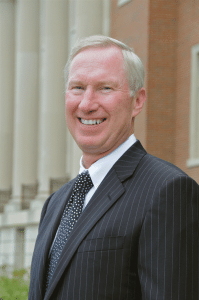
Making a Strong Case
MassMutual Steps Up Its Pro Bono Work in the Community

Mark Roellig says one of the responsibilities any business has is to give back to the community, and MassMutual’s pro bono work is one example of doing just that.
He didn’t have an exact figure, but by doing some quick math, Roellig, the Fortune 100 company’s executive vice president and general counsel, could say without hesitation that the number for this region alone would far exceed that of any law firm in the Greater Springfield area.
And if this roster of attorneys comprised an actual firm, it would have a responsibility, he said, to give back to the community in a number of ways, but especially with pro bono work for residents who cannot afford to hire legal help. It is this thought process that helps explain why, during Roellig’s eight-year tenure as general counsel, MassMutual has certainly stepped up its participation in a number of pro bono initiatives and other efforts involving its legal team.
For starters, there’s something called Just the Beginning, a week-long program during which nearly two dozen area high-school students meet with lawyers from MassMutual, as well as area judges and other volunteers, to explore the different professional opportunities within the legal profession. The week includes a networking reception at the firm’s headquarters on State Street, a mock trial, oral appellate arguments, a courthouse tour, and visits to law firms. There is also something called the Pro Bono Partnership, a clearinghouse of sorts that works to connect in-house lawyers with area nonprofits for transactional work.
But perhaps the most significant undertaking by the company has been its multi-faceted commitment to the Hampden County Legal Clinic, a legal-aid program that assists individuals at no charge who have limited financial resources and who meet specific eligibility guidelines.
Support comes in many forms — from helping those facing eviction in Housing Court to assisting individuals appealing denial of unemployment benefits in District Court — and together, these avenues provide a natural, and highly effective, way for the company’s legal team to escalate its pro bono work in the community, said Roellig.
“If you are operating as a business in a community, whether it be a major corporation like MassMutual or a law firm, frankly, you want your community to be one that’s vibrant and strong and one that attracts and retains high-quality talent,” he explained. “In many ways, Springfield has been challenged over the years, so one of the things we want to do through our law department, and in keeping with our obligations as lawyers, is to ensure that we’re adding value to the community.
“When I arrived here, we didn’t have much of a program, or any program at all, really,” he went on. “And this is something I believe in; if you’re going to do business in a community, you need to give back to that community, and our legal team has been consistently ramping up its commitment.”
The company’s support for the legal clinic, for example, takes several forms, including financial assistance after the previous sponsor opted not to continue its commitment in 2011. Indeed, a $20,000 contribution for this year will help defray the cost of a support staffer at the Hampden County Bar Assoc. (HCBA) tasked with recruiting, scheduling, and assisting lawyers taking part in the various volunteer programs, and also directing consumers to these initiatives.
But the most visible form of support has been the steadily growing number of legal staff from the company — lawyers, paralegals, and other professionals — who have volunteered for the initiatives in Housing Court, District Court, and Probate Court.
More than 20 attorneys have volunteered for the various lawyer-for-a-day (LFD) programs involving those aforementioned courts, said Dorothy Varon, an in-house attorney who is part of that group, and the total number of hours donated by staff members increased from just over 100 in 2012 to more than 400 in 2013, a trend that is projected to continue in the year ahead.
For this issue and its focus on law, BusinessWest takes an in-depth look at how MassMutual and its large legal team are working with various partners, such as the bar association, to assist the rising number of people who need free legal assistance.
Strong Testimony
It’s called ‘eviction day.’
As that name suggests, this is the one day each week (Thursday) at Hampden County Housing Court that is devoted to eviction cases. It’s a long, often emotional day for tenants and landlords alike, one where many of those present aren’t sure if they will have a roof over their head when they leave.
Roellig has volunteered his services for a few eviction days, and can provide compelling testimony regarding the gravity of what’s taking place.
“It’s an intense day,” he said, “because people are coming in with serious problems on either side, whether it’s someone who’s being evicted or someone who feels that he needs to evict someone, and they need some help.”
Assistance in Housing Court has become one of the many ways in which MassMutual has stepped up its pro bono work within the community, said Varon, one of the company’s in-house attorneys, who credited Roellig with getting the ball rolling and keeping it rolling.
“He gave us the green light to propose to him how we could go about creating a pro bono program that would be effective,” she explained, noting that a pro bono committee was formed and a mission statement drafted. “And one of the things that we concluded early on was that connecting with our local bar association would be the most logical way of creating a pro bono program without reinventing the wheel; this was a very logical connection.”
And support from the corporate giant is needed, said Varon, because, while Springfield has a large and diverse legal community, the landscape lacks the very large firms found in Boston and Hartford that provide the critical mass of attorneys needed to effectively staff the many types of pro bono programs that have been created.
“If you think about Boston or New York or Chicago, there are a gazillion lawyers at these megafirms, and there’s all this support coming from these firms — associates can do pro bono work as part of their workload,” she noted. “In a market like Springfield, where you have a lot of solos and a lot of small firms, it’s not so easy to be out there doing a lot of pro bono work. It’s a very difficult market to generate income.”
Meanwhile, need within the community for volunteer legal assistance is growing, said Charles Cassartello, an attorney with Springfield-based Pellegrini, Seeley, Ryan & Blakesley, former HCBA president, and active participant in the legal clinic.
Indeed, while the economy has improved somewhat in the past few years, he said, there has been no decline in the number of people seeking help through various pro bono programs.
And while such initiatives help provide access to justice for people of low or no income, they also play a pivotal role in keeping the wheels of justice turning, said Cassartello, noting that, when individuals decide to represent themselves in legal matters — usually because they have no choice in the matter — the pace of business slows.
“The Springfield District Court is perhaps the second-busiest district court in the Commonwealth — lots of business is conducted there, criminal and civil, and many of the people who come there are unrepresented; they’re pro se litigants,” he explained. “We wanted to develop a program in the District Court to not only assist self-represented people, but take some burden from the court.
“It’s very difficult to deal with self-represented people,” he continued, emphasizing the word very. “It slows things down, and it can really clog the court’s docket.”
To help unclog matters, the District Court lawyer-for-a-day program assists such pro se litigants outside the court, during regularly scheduled office hours, providing help with forms, general problem-solving, and legal advice in civil matters, said Cassartello.
“They walk away with a basic notion about how to approach their case, how to put together a defense, how to make a claim, and more,” he went on, adding that those seeking assistance may also get referrals to lawyers participating in programs featuring sliding fee scales and other vehicles for providing assistance to the poor.
MassMutual’s assistance, in terms of both volunteers and funding to support an administrative infrastructure, has enabled the LFD programs to continue and ultimately assist more individuals, said Cassartello, who used the term “force multiplier” to describe the firm’s impact on HCBA initiatives.
Varon agreed.
“MassMutual can contribute in a lot of ways,” she noted. “One of the ways is with volunteers, but the other way is with resources. To support the clinic means that there’s someone in the community trying to rally all the lawyers — not just the MassMutual lawyers, but also the broader community.
“If we can support the legal clinic and the bar association, we have a much bigger impact on how pro bono services are delivered than if we we’re just sending volunteers, and that’s our basic strategy,” she went on. “It’s important to volunteer, but we also want to support this on a community level.”
Bottom Line
The goal moving forward is for the firm and the bar association to continually look for ways to add new programs and assist more people, said Varon, who described the current roster of initiatives as a “work in progress.”
“We keep trying to grow what we’re doing and improve what we’re doing,” she told BusinessWest, adding that one priority is to improve data-collection efforts, one of the keys to tracking progress and gaining additional support.
In many ways, MassMutual has helped lay the foundation for a comprehensive system of legal assistance, she said, and now the mission is to build atop that foundation.
The financial-services giant is not a law firm, Varon said in conclusion, but its legal department is determined to act like one — and work within the community is certainly a big part of that assignment.
George O’Brien can be reached at [email protected]





